Letters and Dust Devils |
Read more at in70mm.com The 70mm Newsletter |
| Interviewed in Copenhagen, in front of the 3 Falke Bio, the former Todd-AO cinema, 1. September 2015. Transcribed for in70mm.com by Brian Guckian, Dublin, Ireland | Date: 16.09.2015 |
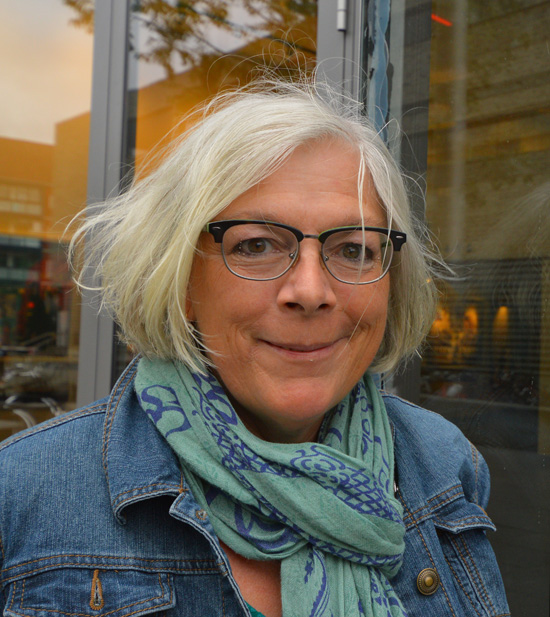 Susan
Jane Todd in Copenhagen, 1. September 2015. Image by Thomas Hauerslev Susan
Jane Todd in Copenhagen, 1. September 2015. Image by Thomas HauerslevThomas: Let me start out by asking you to tell me a bit about yourself, your interests and about your work? Susan: Well I was born in New York City, to Sarah and Michael Todd, and I think I’ve always been an Artist, and also a helper of people - I love helping people. I create handbags, and I’ve had businesses that were big – one time I sold to 80 stores. In a little description of my business, I wrote, “When I was a little girl, in the basement of our house in New York, which was a big, beautiful house, there would be all the props from plays and movies. There was our dress-up department, and the carpet bag from "Around the World in 80 Days", and I would love playing with that bag. And then I grew up to make bags!” Most of the bags I make are like carpet bags – I’m sure that’s connected [Laughs]. My father did a musical off Broadway called "America Be Seated" – it was song, dance, showgirls, and all those costumes ended up at our house – I would love dressing that, and for about 10 years I designed clothes. I’m positive that was a big influence. THa: Tell me a little bit about your childhood in Westchester County – what do you remember - favourite moments – funny moments – moments that made you happy in those days? ST: Well, we had a beautiful big house, and three St. Bernard dogs, and six children - we would never have friends over because we had so much of ourselves – and our father loved nature. But he would go to the city for work – New York City was about a twenty minute drive – and he’d get up late and come home late. But on the weekends we’d go to the forest – I’m the only person in our family who’s not allergic to poison ivy, so I’d have the job of being the first one to go into the forest to see if there was any! We spent a lot of time playing – nature, games – never any TV. And once a year my father had a gigantic party where he would play baseball – it was on the Fourth of July – our big holiday. He would get 150 lobsters, and kegs of Heineken, and there’d be people from Broadway, and shows – lots of fun. I would be a little girl, looking at the people with green teeth from drinking crème de menthe [Laughs]. And they’d be crazy Hollywood people – or mostly Broadway – and it was just fun, good, jolly. Our mother was so loving and sweet. THa: Tell me a little bit about moving to Ireland – what do you remember? I’m asking because it must have been a big change for you as a teenager – going from New York to rural Ireland. ST: That was a bad time, because our mother died in 1972 in February – suddenly. I was 14, and my father quickly married his secretary – within 8 months they got married. And I had never met her before. I love her – she was only 14 years older than me, and so I liked her a lot – that was cool. Then they went on their honeymoon, to Borris, in Ireland, and found that castle to rent, and they came back – same year that our mother died – and said, “We’re moving to Ireland”. So we moved the next summer - after school - and I thought, “I lost my mother, I lost my country club – your friends, your swimming – I lost my country!” I went from a place where you could go to a concert in New York City, and then all of a sudden, the fun was throwing an apple at a bull...so – that didn’t work for me! [Laughter] My father knew me – he was very good at understanding who you are – and he said, “There’s no way that Sue would like to go to the Catholic school and be in a uniform”. So he put me in an alternative school – it was the first year ever they were accepting the fifth and sixth form – who would be eleventh- and twelfth-graders in a college – so I kinda liked it because I was hanging out with artists, and in college with a free schedule – so that was a good choice on his part. All of this happened before Oprah – when people didn’t talk about things. So – your mother died, you’re moving to Ireland – that’s what you’re doing. So it was good, and now I am so thankful – so appreciative that that was the course of my life. THa: How often do you go back to Ireland? ST: Every year – now my father and step-mother – Susan – had two children and they’re in their thirties now. I’m 57 and my brother’s 37...and so they have houses, and family – now we have three houses to visit! |
More in 70mm reading: Mike Todd, Jr. Interview My father never really talked about the motion picture business. Cyrus Todd in Conversation Oliver Michael Todd in Conversation with Thomas Hauerslev The Passing of Oliver Michael Todd Mike Todd Jr.'s "Scent of Mystery" in Smell-O-Vision 3 Falke Bio, Copenhagen, Denmark - The First Todd-AO Theatre in Scandinavia |
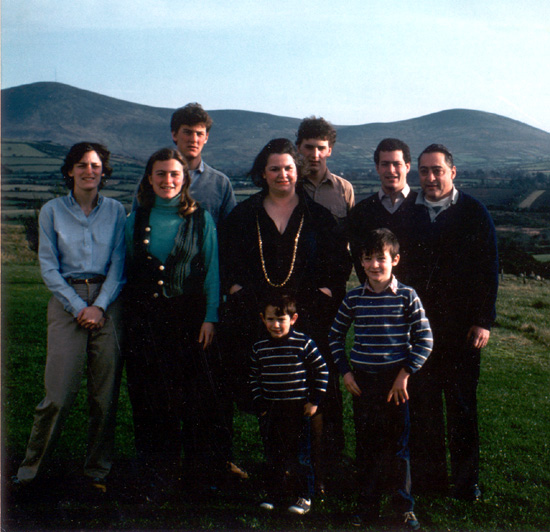 The
Todd Family in Ireland in the late '70s. From left Demmie, Eliza, Daniel,
Susan M Todd, Oliver, Cyrus and Mike Todd Jr. In the front James and Dell. The
Todd Family in Ireland in the late '70s. From left Demmie, Eliza, Daniel,
Susan M Todd, Oliver, Cyrus and Mike Todd Jr. In the front James and Dell.THa: Nice! Can you tell me a little bit about your family today – you have several siblings I know – I have a picture that Susan gave me a few years ago, with all your family – I don’t know the names of course, except your dad and Susan. ST: I’m not in this picture because when I went to Ireland I thought, “I like this place, but not that much – I’m getting out of here!” So how I got out was – I skipped a grade of school, and graduated when I was 16. Then I could go to University – so I left! [Studies photo] Here is Cyrus – he’s the oldest boy...and here is Oliver – he lives where you do Thomas – in Copenhagen. Here is Daniel – he passed away in 2013, suddenly – and he passed away in the same way as my mother, with a heart attack. Here is Dell – did you meet him? THa: I only met Daniel and Susan – ST: Dell lives in Ireland and he has children...and here’s James – the baby of the baby! – he got married last year...and Sue – she’s still doing good...and Eliza – Eliza is the sporty, wonderful one – she was just here. THa: She’s the one who went to Switzerland or Austria? ST: For hiking – She sailed her boat across the Atlantic by herself and has surfed on every continent except Antartica. And you can meet her because she’s a still photographer, and has worked on one hundred movies – and was married to Susan Sarandon’s brother! She could tell you stories about everything – I mean she knows everything – she’s like the best person to talk to. And also interesting behind-the-scenes filmmaking. So that was a beautiful place in Ireland – you went there – THa: We did, and Maria and August played outside on the lawn until we were eating, and Charlotte and myself were talking to Susan around the table – we had lamb – ST: The lamb! THa: Lots of garlic – loved it! |
|
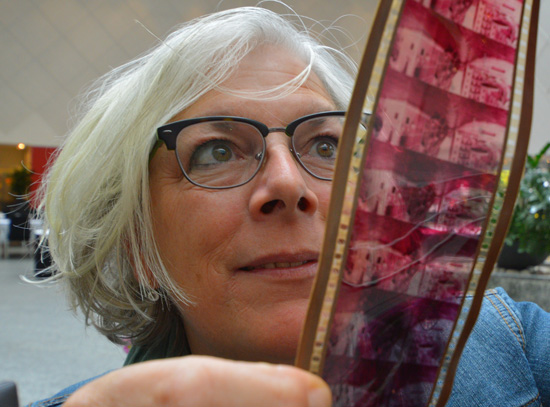 Susan
Jane Todd in Copenhagen, 1. September 2015. Image by Thomas Hauerslev Susan
Jane Todd in Copenhagen, 1. September 2015. Image by Thomas HauerslevTHa: This was a little bit about yourself – we’ll jump ahead. This was a question I asked Oliver as well – when did you become aware of what your Dad was doing with his Manhattan office? What do you remember about the people working there? THa: At what point did you find out what your Dad was doing – this life you were having? ST: Well, I remember being seven or eight years old and you’re in school and teachers are whispering – and I’m thinking, “I hate that”, because they’re just saying I’m related to Elizabeth Taylor. And it’s kind of odd to be – you know you don’t want to be known just because you’re related to somebody. So as a child it was sort of embarrassing. I knew my father always had something to do with movies and theatre because we would rent a little cottage, and he would be hanging out with the actors. He’d be reading scripts – even as a little girl I knew what he was doing. Because it’s a very visual thing, right? He rented the local movie theatre, had a Buster Keaton film festival – he was always doing things. But before he would go to work he would sit in his big, big, big bedroom and smoke a pipe. And sit on the edge of the bed – maybe not even dressed, in his lounge pants – and he’d talk on the phone – when you still had telephones! – and he’d be saying, “God damn it, what the hell are you doing!” And he’d slam down the phone. Then he’d make more calls, and he’s yelling and screaming at people, and I would think, “I don’t like that”, “I don’t like how mean he is at work”. Because when you’re a producer – THa: - you have to shout at people – some do that I think. ST: Yeah, he was being really tough, and I thought, “I don’t like that”. I think my father was very modest – he wasn’t showbizzy, like on the front of newspaper – but he would take advantage of us all getting free tickets to got to every Broadway play we want – free tickets to go to the big Barnum & Bailey Circus – and when we would do that we would all be dressed in our same clothes and photographers would take pictures. So you – we had to know. THa: [Laughs] So it wasn’t a sudden wake-up call, it was this life you had. ST: Ad then you had the costumes in the basement – and one time he was doing a summer stock play – I was eight years old – in Cape Cod, and these people were thirty, maybe, but really old to me – and two men drove up in a convertible to our little cottage, and they just had their underpants on [Laughs] And I heard them saying they’d got stopped by the police – they were actors in the play – and they didn’t have their driver’s license on them, so they gave their pants as collateral! They said they were going back to the policeman, but could they get some money from my father? So odd stuff like that was always happening. |
|
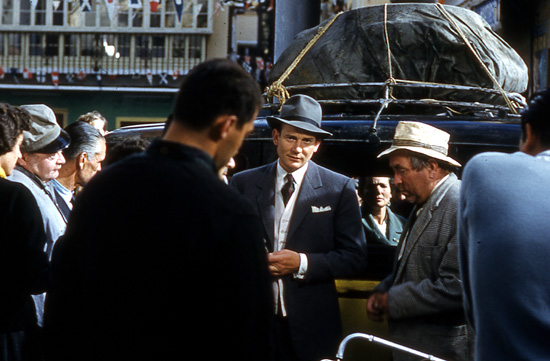 Denholm
Elliot in the middle, and Peter Lorre far left during filming of "Scent of
Mystery" in Spain. Image source Susan Todd Denholm
Elliot in the middle, and Peter Lorre far left during filming of "Scent of
Mystery" in Spain. Image source Susan ToddTHa: Do you remember any of the people on his staff, in his Manhattan office? ST: He had a woman named Midory [Mike Todd Sr's secretary] – THa: She was still there, by the sixties? ST: Yeah, and I loved her – she was so nice. And I knew his attorney – but he wouldn’t be working in the office – Sid Levine. And Bill Doll – THa: He was the Press Representative – ST: Yes, the PR man – then there was the secretary, named Glenda – she lives in Albuquerque still. THa: - Jensen – do you know her? ST: I’ve met her, I don’t know her well – she’s friendly – and she’s available to talk. THa: She wrote a very nice piece ten years ago actually – about working for Michael Todd during the release of "80 Days".... And then she continued with your Dad, ultimately got married and moved somewhere else. A nice story about working in this organisation and what went on in an office like that. ST: My husband did the most amazing thing – we’ve been married 38 years and he said [in 2008], “It’s the fiftieth anniversary of Michael Todd’s airplane crash: let’s find the site of the crash and go to it” (We live in New Mexico). So I called the Grants Airport – I think it was somewhere near there – it’s a tiny airport – and a man answers the phone (and I could tell he’s a hundred years old), and I said, “This is strange, but do you have any idea where my grandfather’s –“ (He said) “I know exactly where it is! The man who owns the ranch still owns the ranch – he’s 87 years old now, I’ll call him up and you go over there”. So we went on the day – March 22nd or 23rd 2008 – 50 years. We get there and the 87 year-old man says, “Not one person, not the pilot, not Art Cohen (he died; he was writing the book), not one person from any of these families has been here in 50 years. I’m glad you came, because it’s been a lot for us to deal with”. So you had to walk about a mile, in the middle of nowhere, and we sit down where the crash was. And Oliver was there, and my husband Michael, and me. And I brought dice, from Las Vegas, and a big glossy photograph – and fancy things, right? And I brought some cornmeal – because in Native American lore you use the first ceremony for letting the soul go. So I put that down and we all told funny stories, and then I stood up and Oliver and Michael, my husband, and I saw – you know what a dust devil is? – it came, and it took away the corn and it moved the things. It was tiny, and we were like, “Ooookay” [Laughter] None of us were like, “woo, woo, woo”, but we were like, “Okay, we believe something is going on here”. That was so bizarre! |
|
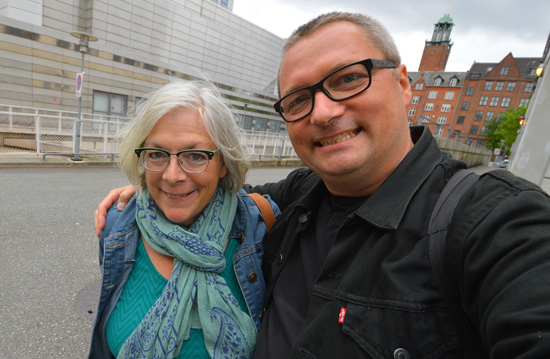 Susan
Jane Todd and Thomas Hauerslev in Copenhagen, 1. September 2015. Image by
Thomas Hauerslev Susan
Jane Todd and Thomas Hauerslev in Copenhagen, 1. September 2015. Image by
Thomas HauerslevTHa: Let’s jump ahead – or actually backwards, to "Holiday in Spain"...have you seen the film? ST: Yes, I saw it probably six times. The first time I saw it was with David Strohmaier - 60th Anniversary in 2012. That was fantastic – my brother Daniel, who passed away, and I, were invited to speak in front of the theatre before that screening. It was late – 11 o’clock at night – and so we were rehearsing all day. I was going to be the funny person and he the serious person. He talked all about the making of the movie and our father also making the rollercoaster scene [in "This is Cinerama"] – because it was a Cinerama Festival. Then I talked about how my father always told me – and this is the truth – ever since he made that movie – because it was Smell-O-Vision – he completely lost his sense of smell. Because he spent weeks in a chemistry lab that made perfume – testing the smell – and he just ruined his nose. I loved that he had told me that, because I could be a teenager and come home and smoke pot and he could never smell it! [Laughter] But that would really be a handicap for a father – to not smell – it’s weird. That Festival was well attended – people drove for that one movie – I met somebody who drove for maybe 900 miles. It was awesome – they even gave the Intermission. It was in the authentic Cinerama Dome Theatre, in Los Angeles, and it was very impressive, and people asked us questions. At the Intermission I heard people talking about, “I didn’t realise the Cameraman was so-and-so” – they were very serious, and happy to be there. They had a camera in the lobby you could look at, and David Strohmaier was wearing a lab coat with a logo, and he had gloves on – there were probably a hundred people that know everything they know and they were all there! [Laughs] THa: Was that the first time you saw it? ST: Yes, and I really liked it. I thought, “Okay, I don’t know if the movie’s good but I know that they realised this is a really awesome camera and if you want to see a really beautiful scene go see a Cinerama movie. It doesn’t matter what the story is, they’re showing off their camera – is what the movie is”. It was really, really nice. Then David [Strohmaier] made a DVD that just got released – in Blu-Ray. Before he did that, he had me interviewed and I think I’m on that DVD – a 20-minute film of interviews. Barbara Bentley was also interviewed – THa: Did people come and talk to you afterwards? ST: Yes, people were asking us questions, and happy that we were there...it was good. THa: Do you have any recollections of your father talking about "Scent of Mystery", because Oliver said he couldn’t really remember his Dad talk about the film, rather than having a good sense of humour about it – ST: Okay. My father had the difficult job of following in his father’s footsteps. I think my father always wanted to be a philosopher: that was his Major in college. He loved fine art – painting and sculpture. And good literature. But he got stuck with this because his father died. They were just about to work on a Cinerama movie – Don Quixote. He couldn’t do it because he was in so much grief – so he made this project. So I can remember my father talking about it – probably in an honest way, not being humble, but how he wasn’t that great at it. He wasn’t cut out to be doing this, but he ended up by default – this is what he did. He would tell me stories like, “That was the summer that Hemingway was working on a book about rival cousins, bullfighters” – do you know about that story? It was the summer and he was writing a book about these cousins that were enemies. And they were both amazing bullfighters. They were in the same cities at the same time and so after filming my father would go have a glass of wine at a bar, and there would be Hemingway. And so they would talk, and chat, and he told me that Peter Lorre had had a heart attack when they were working on the movie – or maybe he was feeling really bad. And my father said, “I’m sending you back to Santa Monica to get better – you can’t be in a hospital in Madrid”. So they took a break from filming and sent him back. And the reason I remember that story is because my father said, “When we flew in 1959 to Madrid our plane broke down and we ended up in Norway for two weeks to get repairs before we could go to Madrid”. Anyway, I thought that was brave of him to send Peter Lorre back. I think my father was in a lot of grief...it was devastating that his father died. I think a lot of things were clouded by his own grief. THa: After the film was done around 1960, did he have contact with Jack Cardiff and Peter Lorre, and the actors in the film -? ST: Yes - I’m sure about that – yes. THa: That’s my impression from Oliver – that he kept in contact – despite of course living in the United States first, then in the ‘70s in Ireland – he kept contact with his friends – ST: Yes he did – our stepmother tells me stories, like he would laugh at himself, saying, “What was I thinking – Smell-O-Vision being successful?” You have to own the theatre – that’s a problem. You have to have the special pipes in the theatre that cost thousands of dollars – that’s a problem. How do you get the smell from the bullfight away when the rose garden happens? That’s a problem! [Laughs] He could laugh at himself about that. And then he was very, very superstitious – in a theatre kind of way – do you know? THa: I’ve just heard about actors, doing all sorts of funny things – ST: Like “Never put a hat on a bed – you’re dead if you put a hat on a bed” And he would never, ever go to his own opening – ever. And he would sit in a restaurant waiting at a table, drinking a Martini – waiting for the family of whoever went to the opening to come in. I went to the opening of his movie "The Bell Jar" – I was probably 19 or 20 – and I stupidly walked in the restaurant first – he was looking at my face – it should have been somebody else because the movie was bad! [Laughs] And so I had to be like, “Dad – sorry – keep drinking your Martini”. And he could actually laugh...I think he had Survivor’s Guilt. And plus, he was immediately put into that business – forced to. THa: And do you remember the short film that preceded it, it was called "The Tail of Old Whiff"? Remember the small cologne bottle you have, with the dog? That’s Whiff – there was a short film, a cartoon – about this dog, and it was called The Tail – "The Tail of Old Whiff" – have you ever heard about it? Nobody knows where it is. ST: No, but I want to see that. My stepmother told me that my father drew that picture of the dog – that’s his drawing. He was a good artist, in a simple way. |
|
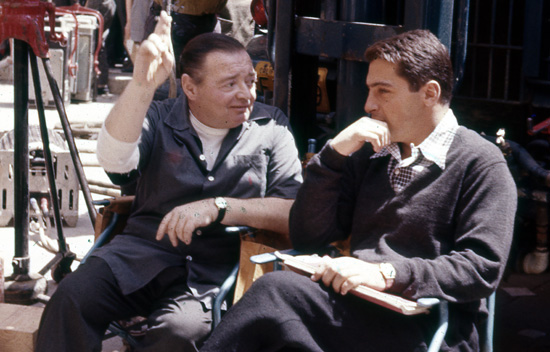 Peter
Lorre and Michael Todd Jr. during filming of "Scent of Mystery" in Spain.
Image source Susan Todd Peter
Lorre and Michael Todd Jr. during filming of "Scent of Mystery" in Spain.
Image source Susan ToddTHa: Nice – Your granddad was a very successful Producer who married Elizabeth Taylor. Why has there never been a film about him? Oliver mentioned a script written by a family member – ST: My brother Daniel – he was working on that, but then he passed away. THa: Michael Todd was such a flamboyant person – marrying Elizabeth Taylor and having the greatest picture ever made – in 1957...nobody has made a film about him - ST: I think it’s a good idea – do you want to do it! THa: I don’t think I have the capability! But it’s so obvious to do a film about a person like that. ST: But just now, it has to be a very good film. Because he was an incredible, crazy man. I mean I can tell you stories that are disturbing...but you have to laugh at some of the things he did. My father told me that when he was ten years old he went to Gypsy Rose Lee’s apartment...and of course my grandfather is going to go in the bedroom with Gypsy Rose Lee. Why would you bring your 10-year-old son on that trip? But he did. So to entertain my father he gave him a bag of popcorn. And Gypsy Rose Lee had a little tiny dog and my father gave the popcorn to the dog, and he choked and he died! And then he had to knock on the bedroom door – [Laughs] My father laughed at that, because it was so crazy and funny...but I think that could be a very good movie! I think it would have to be well done, because there just was a movie – I saw it last year – about Cantinflas – that has Mike Todd, and Cantinflas making the movie of "Around the World in 80 Days". It stars an actor playing Mike Todd who was in the TV show "The Sopranos" – I didn’t like the movie. I think you just put it out there and it can happen. I’ll ask my brother Daniel’s partner where that script is – the screenplay he was writing. And Susan in Ireland might know where it is because they were working together. I have hundreds of very funny and crazy stories about my grandfather. Like one story – why would you do this – my father was at a prep school, or high school, and for his graduation – this is like, 1948 – probably 1949 – and my grandfather flies to the graduation in a helicopter! That is so embarrassing – the 18-year-old boy, and you’re making a big spectacle out of it...you just want to be discreet! But he did everything like that. THa: Maybe we should do a second conversation about Todd Senior...and all his mannerisms or crazy things – ST: - Yeah. THa: OK – did you ever see Cinerama, or Todd-AO, in a big cinema? Big screen, lots of seats - ST: Yes – THa: You did? Recently, in Los Angeles? ST: Yes, I was in that – THa: OK, so you saw everything there – ST: Yeah – everything – THa: What did you think of that system now – the rollercoaster? That was your Dad doing it - ST: I know – and [he] was 19 years old I think. I can’t believe it – he never talked about that – well maybe he would be joking. He would say, “I did that with all the short ends of the film”. I’m sure his father made him work pretty hard – because you had to go on the rollercoaster 20 times to get all of it if you’re only filming with short ends. Then he’d laugh that that cost the same price as one of his father’s haircuts – THa: Yes, $28 or something like that – What do you think about it when you saw that – how did you feel about “This is my dad who did that”? – so many years ago? ST: Excellent – proud – happy. And the thing is, I think it's funny, it’s the most underrated, understated, amazing thing of my father and grandfather...it’s not being married to Elizabeth Taylor, it’s Cinerama. It’s the film – it’s the process thing. I think that’s what should be what they’re famous for. It’s not as glamourous, but to me that is the best thing. THa: It changed moviemaking, completely – from going from square movies like this [Gestures] to wide movies and big screens. ST: Yes, and how they figured everything out - and the business end of it was interesting. |
|
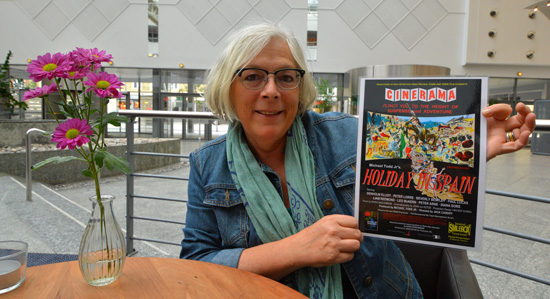 Susan
Jane Todd in Copenhagen, 1. September 2015 in front of the former Todd-AO
cinema. Image by Thomas Hauerslev Susan
Jane Todd in Copenhagen, 1. September 2015 in front of the former Todd-AO
cinema. Image by Thomas HauerslevTHa: Did you father ever talk about "This Is Cinerama"? ST: - No – not that I can remember. But you know what? My sister Demmie, and Cyrus, they both worked in movies. I was like, “What are those guys talking about?” But those two probably – THa: Well, my next question is, did you work in the movie industry? I know that you didn’t, but did you ever have a dream of making movies? Like your Dad or your Grandfather? ST: Yes, just recently – I had an amazing thing happen to me, and I wanted to make a movie about it. It’s an amazing story: my husband and I bought a house, just to fix up and re-sell – we were never going to live there. And the house got robbed, right before we bought it – they even stole the kitchen cupboards – everything – they really robbed the house. We then went to go buy the house and the lady who owned it never came to clean out anything – because her husband had a heart attack at the airport before she could come. So we tell the lady, “You need to sign a piece of paper that says we were not responsible for the robbery and we’re not responsible for anything in this house – we’re buying everything”. She signed the paper, we go in the house – there’s nothing in the house...except in a closet, in a cardboard box, are 336 pages of hand-written letters by the artist Georgia O’Keeffe, written from 1929 to 1940. That’s really amazing! Talking about her paintings, and they were all written to an avant-garde filmmaker who was a friend of hers – who made "Nanook of the North" – made early, early movies. And he was friends with people that my Grandfather knew. So here I am, reading all these letters, and they’re mentioning people’s names – people’s names that Glenda Jensen knows. And she [Georgia O’Keefe] had her paintings at the 1939 New York World’s Fair - she was the first female Artist to represent the State of New York at that Fair - and at that exact Fair my Grandfather made a play called "The Hot Mikado" – which is a kind of girly show with Bill "Bojangles" Robinson – and she writes in one of the letters – she wrote beautiful - “It’s a misty day, and I’m walking down at the Fair. I’m the only person walking”. And I was just imagining my Grandfather walking – and those letters have so much of six degrees of separation. And I asked Georgia O’Keeffe, in the sprit, “Why did you give me these letters?” They could have been robbed – the lady could have taken them – and I got the message, “You need to do something with this”. And I thought – I could make a movie. THa: So what have you been doing with them so far? ST: I wrote a book – "Georgia’s Gift" – because she gave that to my husband and I! – and our real dream is, we can sell them and maybe get a million dollars! [Laughs] And she gave me the gift of thinking I could make a movie; she gave me the gift of writing a book. And – all the stories - I would call my stepmother and say, “Do you know this man? It’s in a letter from 1944” “Oh yes, of course, look in the Index of your father’s book, he’s in there”. THa: [Laughs] "A Valuable Property"! ST: Yeah, and there’s the same people in those letters – don’t you think that’s odd? THa: Yes, very odd...it’s just like the dust devil! Do people remember your Dad and Granddad today? Oliver said no – ST: If you go to the right nightclub in New York there’s a picture of my Grandfather; if you go the right hotel in Cannes you’ll see photographs...but generally speaking, no, probably not – I mean people my age, yes, I’d say definitely...but not younger than 40. THa: I have one question left – it’s not really a question, but – do you have anything you want to add to this conversation? Something you think we should have on tape? ST: I think it should be acknowledged – not because it has something to do with me personally, but because it’s a big part of history - I think it should be acknowledged your effort, your passion, your intelligence. Your craft – about putting all this together, making your website, making festivals – because you’re doing that because you love it. You wouldn’t be doing something if there wasn’t somebody to receive it. That’s like – physics. And so thank you for doing it, because there’s people to receive it. THa: Thank you. And it started here [for me at the 3 Falke Bio] – isn’t that funny? Talking about letters, and dust devils......... |
|
| Go: back - top - back issues - news index Updated 22-01-25 |
